With a new commissioner confirmed in September, the Commission once again has five commissioners. A philosophical divide along party lines surfaced this month in two decisions.
The first decision involved the settlement of an administrative lawsuit filed by the CPSC in February. The lawsuit alleged that a distributor refused to recall three-wheeled jogging strollers after consumer complaints that the front wheel can detach suddenly during use, causing injuries to at least 50 children and 47 adults. To settle the lawsuit, the distributor agreed to notify dealers and retailers and to “develop and launch an information campaign that will include an instructional video demonstrating how to safely and correctly operate” the stroller. Eligible consumers who participate in this campaign can receive “incentives,” such as hardware to repair the stroller or a 20% discount towards the purchase of a new stroller from the same distributor.
The CPSC voted 3-2 to accept the settlement. Commissioners Adler and Kaye — two Democrats appointed by Obama — dissented, arguing that more should be required of the distributor. The dissent explained that the settlement is misleading because of its treatment of the term “recall.” Specifically, the settlement states that it “shall not be construed as a recall” and the distributor’s notice to dealers and retailers states “[w]e are pleased to report that we have resolved this litigation without a recall by developing and launching an information campaign.” The dissent said the term “recall” “commands consumers’ instant attention” and “signals that a manufacturer has agreed to take some kind of corrective action to fix a safety problem with its product.” Thus, according to the dissent, it is “aggressively misleading” to omit the term and “consumers may well ignore any information campaign that is fairly complex to follow and understand.” The dissent also disagreed with the limited nature of the corrective action. The information campaign will last for 24 months and it limits the availability of incentives to a period of 12 months. The dissent pointed out that “there is a substantial secondary market for these strollers and that large numbers of them remain in use.” Thus, the consumers’ relief “should not have such a short expiration date.” Most notably, the dissent expressed concern about the future implications of this settlement: “we fear that other respondents will invoke this agreement as precedent in future recalls, thereby lessening safety for far more consumers than are affected by this agreement.”
The second decision concerned a $1M civil penalty involving the same trash can subject to a multi-million dollar civil penalty a few weeks ago. Last month, the CPSC announced a $3.85M civil penalty against a major retailer for failing to report that a trash can it sold contains a plastic collar that may dislodge, exposing a sharp edge and posing a laceration hazard to consumers. The retailer received 92 consumer complaints about this alleged defect but did not immediately notify the CPSC. Now, the CPSC has announced a $1M civil penalty against the trash can’s Chinese manufacturer. The manufacturer also received consumer complaints about this alleged defect and it approved a design change to address the laceration hazard. It did not, however, immediately notify the CPSC. The settlement emphasizes that the manufacturer “is a small Chinese company” and “was completely unaware of the CPSC reporting requirements.” It also permits the manufacturer to pay the civil penalty in four installments, suggesting it does not have enough cash on hand to pay in one lump sum. In addition to the civil penalty, the manufacturer agreed to maintain a compliance program and a system of internal controls and procedures to ensure it discloses information to the CPSC in accordance with applicable law.
Three aspects of this $1M civil penalty are noteworthy. First, the CPSC has now assessed a total of $38.6M in civil penalties in 2018—higher than any other calendar year on record. Second, the CPSC assessed a civil penalty against the manufacturer and the retailer of the same product. A party who commits one or more of the Consumer Product Safety Act’s prohibited acts is subject to a civil penalty. See 15 U.S.C. §§ 2068–2070. Thus, these two civil penalties for the same product serve as a reminder that all parties in a product’s manufacturing and distribution chain must comply with federal consumer product safety laws or they risk exposure to a civil penalty. The CPSC will pursue all parties it views as culpable. Third, the CPSC’s 3-2 vote to accept the settlement again saw Commissioners Adler and Kaye dissenting on grounds that the penalty did not go far enough. The dissent explained that “[w]e cannot support this settlement agreement because we believe the size of the proposed penalty is too small and does not adequately reflect the seriousness of [the manufacturer’s] violation.” In particular, the dissent cited to the statutory civil penalty factors:
- The nature, circumstances, extent, and gravity of the violation.
- The nature of the product defect;
- The severity of the risk of injury;
- The occurrence or absence of injury;
- The number of defective products distributed;
- The appropriateness of such penalty in relation to the size of the business of the person charged, including how to mitigate undue adverse economic impacts on small businesses; and
- Such other factors as appropriate, including whether and when the party had a safety or compliance program in place relating to the violation, the party’s history of non-compliance, and the party’s economic gain from non-compliance.
15 U.S.C. § 2069(b); 16 C.F.R. § 1119.4(b). The dissent then criticized the majority for relying “almost exclusively” on the sixth factor and explained that the manufacturer changed its design but waited over a year to report to the CPSC and only “after [the retailer] urged it to do so.” The dissent continued: “[b]y almost any measure of culpability” the manufacturer “warrants a civil penalty at least equal to that imposed on the retailer.” Finally, the dissent emphasized that the sixth factor is “important, but by no means controlling.” It suggested that the Commission should have considered the “other equally important” factors and imposed a “roughly equivalent” civil penalty as the one imposed on the retailer but “suspend[ed] a large enough portion of the penalty so that it would not have an undue adverse economic impact” on the manufacturer. Because the Commission did not do so, “anyone not conversant with the facts of this case will automatically assume that [the manufacturer’s] transgression is minor compared to” the retailer’s.
These two decisions highlight the sometimes opaque nature of the CPSC’s decision-making process over settlements. Although dissenting opinions were drafted to explain why the settlements should be rejected, there are no majority opinions stating why the settlements were approved. Does using the term “recall” truly command the consumers’ instant attention? Did the majority actually focus almost exclusively on the sixth factor from the regulations? We do not know because there is no opinion explaining the rationale for either settlement’s approval. This reality makes it difficult for retailers, distributors, and manufacturers to understand and predict the Commission’s behavior and therefore change their behavior accordingly.
Lawyers from Hunton Andrews Kurth LLP’s Insurance Coverage practice group weigh in on recent recall insurance disputes.
The longstanding frozen peas insurance coverage dispute in National Frozen Foods Corp. v. Berkley Assurance Co. continues. We previously commented on National Frozen Food’s coverage claims for costs arising out of a recall of frozen peas, Berkley’s motion to dismiss and transfer venues, and the Washington district court’s invalidation of the Berkley policy’s forum selection clause. Having settled the venue dispute, the parties conducted discovery and have now filed cross-motions for summary judgment. NFF has asked the court to grant its negligence and fiduciary duty claims against its insurance broker (AmWINS) based on NFF’s longstanding relationship with AmWINS and AmWINS’s role in brokering the recall insurance policy at issue. NFF faults AmWINS for submitting an incorrect application on NFF’s behalf, failing to bring errors in the application to NFF’s attention, and preparing and disseminating an incorrect “risk summary” to Berkley and other prospective insurers.
AmWINs has disputed NFF’s contentions, based largely on the characterization of its role as a “wholesale” broker that neither guaranteed coverage nor assumed responsibility for the actions of NFF or its insurers in the transaction at issue. AmWINS further asserts that any lack of coverage was due to NFF’s own negligence in failing to disclose a prior product recall in its insurance application and disputes that it was involved in placing the insurance policy with Berkley. For these reasons, AmWINS asked that the court dismiss all of NFF’s claims against it.
For its part, Berkley seeks summary judgment on numerous coverage defenses, including that coverage is excluded where NFF deliberately sold contaminated peas to customers without implementing reasonable safeguards and, therefore, increased the possibility of a loss under the policy. In addition to raising coverage defenses, Berkley argues that the policy should be rescinded because NFF made a material misrepresentation when it failed to disclose prior recall events in its application and risk summary. Both NFF and AMWINSs dispute that their respective roles before, during, and after the contamination event caused or contributed the claims at issue in the lawsuit. We will continue to monitor this case for further developments.
Total Recalls: 17
Hazards: Fire/Burn/Shock (5); Injury (2); Violation of Federal Standard (2); Choke (2); Fall (2); Laceration (2); Lead Exposure (1); Failure to Fully Alert (1); Drown (1)

- Partner
Syed represents clients in connection with insurance coverage, reinsurance matters and other business litigation. Syed serves as the head of the firm’s insurance coverage practice. He has been admitted to the US Court of Appeals ...
- Partner
Kelly practices as a commercial and regulatory litigator on products liability and post M&A disputes and issues and serves as one of the firm’s Deputy General Counsel focusing on law firm ethics, conflicts, and risk management ...
- Partner
Geoff works closely with corporate policyholders and their directors and officers to resolve high-stakes insurance disputes. He leads the Firm’s D&O insurance and executive protection practice.
As a partner in Hunton’s ...
Search
Recent Posts
Categories
- Advertising & Marketing
- Bankruptcy
- Class Action
- Competition/Antitrust
- Consumer Protection
- Corporate Governance
- Environmental
- General
- Health Care
- Insurance
- IP
- Labor and Employment
- Mergers & Acquisitions
- Patent Infringement
- Patents
- Privacy & Cybersecurity
- Product Liability
- Real Estate
- Regulatory
- Regulatory
- Technology & E-Commerce
Tags
- 29 C.F.R. § 785.48
- 396-r
- 3D Printer
- 3D Printing
- A. Todd Brown
- A.S. Research (ASR)
- Aaron P. Simpson
- Administrative Exemption
- Advertisers
- Advertising
- Advertising Claims
- Advertising Guidelines
- Advertising Idea
- Agency Guidance
- AI
- AI Interviewing Platforms
- AI Technology Reviews
- Algorithmic Accountability Act
- Align
- Americans with Disabilities Act
- Americans with Disabilities Act (ADA)
- Andrea DeField
- Ann Marie Buerkle
- Annual Reports
- anti-aging
- Anti-Discrimination
- APEX Agreement
- Arbitration
- Arbitration Agreements
- Arizona
- Arkansas
- Arthritis
- Artificial Intelligence
- Artificial Intelligence (AI)
- Asbestos
- Assembly Bill 51 (AB 51)
- ATDS
- Australia
- Auto-renewals
- automatic telephone dialing system (ATDS)
- Automobile
- Automotive Body Parts Association (ABPA)
- Back to Work Emergency Ordinance
- biased endorsements
- Biden Administration
- Biometric Data
- Biometric Information
- Biometric Information Privacy Act (BIPA)
- BIPA
- Bitcoin
- Blockchain
- Board Diversity Disclosure
- Boards of Directors
- Bonuses
- Braille
- Branding
- Breach
- Breach of Contract
- Business Interruption
- Business Interruption Loss
- Businessowner’s Insurance
- California
- California Assembly Bill 2011
- California Employment Laws
- California Fair Employment and Housing Act
- California False Claims Act
- California Labor Code
- California Senate Bill 6
- California’s Unfair Competition Law
- CAMS
- Canada
- Cannabis
- CBD
- CBP
- CCPA
- Celebrity Endorsers
- Center for Disease Control (CDC)
- CFIUS
- CGL
- Chatbot
- Children’s Advertising
- Children’s Advertising Review Unit
- Children’s Online Privacy Protection Act (COPPA)
- China
- Christopher J. Dufek
- Christopher W. Hasbrouck
- Christy Kiely
- Class Action
- Class Actions
- Clawback
- Click-to-Cancel
- Climate Change
- clinical trials
- Collective Action
- Colorado
- Commercial General Liability
- Commercial Leasing
- Commercial Messaging
- Commodity Futures Trading Commission
- Compliance
- Congress
- Connecticut
- Consent
- Consent Order
- Consumer Advertising
- Consumer Data
- Consumer Financial Protection Bureau
- Consumer Fraud
- consumer loyalty program
- Consumer Product Safety Act
- Consumer Products
- Consumer Products Safety Commission (CPSC)
- Consumer Protection
- Consumer Review Fairness Act of 2016 (CRFA)
- Consumer Reviews
- Contamination
- Contract Law
- Controlled Substance Act
- Cookware
- COPPA
- Copyright
- Coronavirus/COVID-19
- Corp Fin
- Corporate Governance
- Corporate Reporting
- Corporate Sustainability
- Corporate Transparency Act (CTA)
- Counterfeit Goods
- Counterfeit Goods Seizure Act of 2019
- CPRA
- CPSA
- CPSC
- Crack House Statute
- CRFA
- Cryptocurrency
- CSPA
- Cuba
- Currency
- Customs and Border Protection
- Cyber Coverage
- D&O
- D&O policies
- D. Andrew Quigley
- Damages
- Data Breach
- Davidson
- Deceptive Advertising
- DEI
- Delaware
- DEP
- Department of Justice
- Department of Labor
- Development Impact Fee
- Digital Assets
- digital currency
- Disclosures
- Distribution
- Division of Corporation Finance
- Dodd-Frank
- DOJ
- DOL
- Duty to Defend
- Duty to Indemnify
- e-liquid products
- Eddie Bauer
- EEOC
- Electric Vehicles
- Eleventh Circuit
- Emily Burkhardt Vicente
- Employee Rights
- Endorsement
- Endorsement Guides
- Endorsement Notice
- Endorsements
- endorser monitoring requirements
- Enforcement
- Environmental Impact
- Environmental Protection Agency
- Environmental Protection Agency (EPA)
- EPA
- Epidemic
- ESG
- ESG Disclosure
- EU Regulation
- European Union
- European Unitary Patent
- EV Charging
- Exceptions
- Exclusions
- Executive Orders
- Exercise Machines
- Extended Producer Responsibility (EPR)
- FAA
- Fair Labor Standards Act
- Fair Labor Standards Act (FLSA)
- fair use
- False Advertising
- False Advertising Claims
- False Advertising Law
- False Claims Act
- Family Leave Policies
- FCC
- FCRA
- FDA
- Federal Arbitration Act (FAA)
- Federal Communications Commission
- Federal District Court
- Federal Trade Commission
- Federal Trade Commission (FTC)
- FFDCA
- FIFRA
- Fifth Circuit
- Final Rule
- FinCEN
- Fireworks
- First Amendment
- Fixing America’s Surface Transportation (FAST) Act
- Florida
- Florida House of Representatives (HB 963) and Florida Senate (SB 1670)
- Florida Legislature
- FLSA
- FLSA/Wage & Hour
- food delivery
- Food Safety
- Form 10-K
- Formaldehyde Standards for Composite Wood Products Act of 2010
- fractional interests
- Franchise
- Frederic Chang
- Free Trials
- FTC
- FTC Act
- Gavin Newsom
- GDPR
- General Liability
- Geoffrey B. Fehling
- Georgia
- Gift Cards
- GoodRx
- Gramm-Leach-Bliley (GLB) Act
- Green
- Green Guides
- Greenhouse Gas
- Gun Safety
- Hart-Scott-Rodino
- Hart-Scott-Rodino (HSR)
- hashtag
- Hawaii
- Health Care
- Health Claims
- Hedge Fund
- HIPAA
- hoverboards
- human capital
- Human Rights
- Illinois
- Illinois Artificial Intelligence Video Interview Act (the Illinois Act)
- Illinois Biometric Information Privacy Act (BIPA)
- Indiana
- Influencer Marketing
- Infringement
- initial public offerings (IPOs)
- Injury
- Insurance
- Insurance Loss
- Insurance Provider
- Intellectual Property
- Intellectual Property Licenses in Bankruptcy Act
- Interest Rate
- International
- International Trade Commission
- International Trade Commission (ITC)
- Inventorship
- INVISALIGN
- Iowa
- IP
- Ireland
- IT
- ITC
- iTERO
- Junk Fees
- Katherine Miller
- Kurt A. Powell
- Kurt G. Larkin
- Labeling Rules
- Labor
- Labor Code Private Attorneys General Act of 2004 (PAGA)
- Labor Organizing
- Labor Unions
- Land Use
- Landlord
- Latin America
- Lautenberg Act
- Lawsuit Reform Alliance of New York (LRANY)
- Lead
- Lease
- Legislation
- Leveraged Loans
- Liability Insurance Policy
- Liberty Insurance Corporation
- Liberty Mutual Fire Insurance Company
- LIBOR Discontinuation
- liquidity
- Litigation
- Live Chat
- Lost Profits
- Lost Sales
- Louisiana
- M&A
- Made in the USA
- Made in USA
- MagicSleeve
- Magnuson-Moss Warranty Act
- Magnuson-Moss Warranty Act (MMWA)
- Maine
- Malcolm C. Weiss
- Manufacturing
- Marketing Claims
- Maryland
- Massachusetts
- Matthew T. McLellan
- Maya M. Eckstein
- MD&A
- Medtail
- Membership cancellation
- Metaverse
- MeToo Movement
- Mexico
- Michael J. Mueller
- Michael S. Levine
- Minimum Wage
- Minnesota
- Minnesota Pollution Control Agency (MPCA)
- Misclassification
- Mislabeling
- Mission Product Holdings
- Missouri
- Mobile
- Mobile App
- Multi-Level Marketing Program (MLM)
- NAA
- NAD
- NASA
- Nasdaq
- National Advertising Division
- National Advertising Division (NAD)
- National Advertising Review Board
- National Products Inc.
- National Retail Federation
- Natural Disaster
- Nebraska
- Neil K. Gilman
- Network Outage
- Nevada
- New Jersey
- New York
- NHTSA
- NIL rights
- Ninth Circuit
- NLRA
- NLRB
- no-action request
- Non-Compete
- Non-Exempt
- non-fungible token (NFT)
- North Carolina
- Nutrition Labels
- Obama Administration
- Occupational Safety and Health Administration (OSHA)
- Occurrence
- Office of Labor Standards Enforcement
- Ohio
- Oklahoma
- Online Cash Providers
- Online Retailer
- online reviews
- Opioids
- Oregon
- Overboarding
- Overtime
- Overtime Exemptions
- Ownership
- Packaging
- PAGA
- Pandemic
- Patent
- Patent Infringement
- Patents
- Paul T. Moura
- Pay Ratio
- pay-to-play rankings
- Penalty
- Pennsylvania
- Personal and Advertising Injury
- Personal Data
- Personal Information
- Personally Identifiable Information
- Pesticides
- PFAS
- Physical Loss or Damage
- Policy
- price gouging
- Privacy
- Privacy Guidelines
- Privacy Policy
- Privacy Protections
- Product Packaging
- Prohibition on Sale
- Property Insurance
- Property Rights
- Proposed Legislation
- Proposition 65
- Proxy Access
- proxy materials
- Proxy Statements
- Public Companies
- Purdue Pharma
- Randall S. Parks
- Ransomware
- real estate
- Recall
- Recalls
- Regulation
- Regulation S-K
- Restaurants
- Restrictive Covenants
- Retail
- Retail Development
- Retail Industry Leaders Association
- Retail Litigation Center
- Rounding
- Rulemaking
- Ryan A. Glasgow
- Sales Tax
- Salesforce
- SD8 coins
- SEC
- SEC Disclosure
- Second Circuit
- Section 337
- Section 365
- Secure and Fair Enforcement Banking Act of 2019 (“SAFE Banking Act”)
- Securities
- Securities and Exchange Commission
- Securities and Exchange Commission (SEC)
- security checks
- Senate
- Senate Data Handling Report
- Sergio F. Oehninger
- Service Contract Act (SCA)
- Service Interruption
- Service Provider
- SHARE
- Shareholder
- Shareholder Proposals
- Sign-In Wrap Agreement
- Slogan
- Smart Contracts
- Social Media
- Social Media Influencers
- Software
- South Carolina
- South Dakota
- Special purpose acquisition companies (SPACs)
- Sponsors and Gifting
- Sponsorship
- State Attorneys General
- State Legislation
- Store Closures
- Subscription Services
- Substantiation
- Substantiation Notice
- Supplier
- Supply Chain
- Supply contracts
- Supreme Court
- Sustainability
- Syed S. Ahmad
- Synovia
- Targeted Advertising
- Tax
- TCCWNA
- TCPA
- Technology
- Telemarketing
- Telephone Consumer Protection Act
- Telephone Consumer Protection Act (TCPA)
- Tempnology LLC
- Tenant
- Tennessee
- Terms and Conditions
- Texas
- the Fair Credit Reporting Act (FCRA)
- Thomas R. Waskom
- Title VII
- tokenization
- tokens
- Toxic Chemicals
- Toxic Substances Control Act
- Toxic Substances Control Act (TSCA)
- Trade Dress
- Trademark
- Trademark Infringement
- Trademark Trial and Appeal Board (TTAB)
- TransUnion
- Travel
- Trump Administration
- TSCA
- TSCA Title VI
- U.S. Department of Justice
- U.S. Department of Labor
- U.S. Food and Drug Administration
- U.S. House of Representatives
- U.S. Patent and Trademark Office
- Umbrella Liability
- Union
- Union Organizing
- United Specialty Insurance Company
- Unmanned Aircraft
- Unruh Civil Rights Act
- UPSTO
- US Chamber of Commerce
- US Customs and Border Protection (CBP)
- US Environmental Protection Agency (EPA)
- US International Trade Commission (ITC)
- US Origin Claims
- US Patent and Trademark Office
- US Patent and Trademark Office (USPTO)
- US Supreme Court
- USDA
- USPTO
- Utah
- Varidesk
- Vermont
- Virginia
- volatile organic compound (VOC) emissions
- W. Jeffery Edwards
- Wage and Hour
- Walter J. Andrews
- Warranties
- Warranty
- Washington
- Washington DC
- WCAG
- Web Accessibility
- Website
- Website Accessibility
- Weight Loss
- Wiretapping
- World Health Organization (WHO)
- Wyoming
- Year In Review
- Zoning Regulations
Authors
- Gary A. Abelev
- Alexander Abramenko
- Yaniel Abreu
- Syed S. Ahmad
- Brandon Bell
- Fawaz A. Bham
- Michael J. “Jack” Bisceglia
- Jeremy S. Boczko
- Brian J. Bosworth
- Shannon S. Broome
- Samuel L. Brown
- Tyler P. Brown
- Melinda Brunger
- Jimmy Bui
- M. Brett Burns
- Olivia G. Bushman
- Matthew J. Calvert
- María Castellanos
- Grant H. Cokeley
- Abigail Contreras
- Alexandra B. Cunningham
- Merideth Snow Daly
- Javier De Luna
- Timothy G. Decker
- Andrea DeField
- John J. Delionado
- Stephen P. Demm
- Mayme Donohue
- Nicholas Drews
- Christopher J. Dufek
- Robert T. Dumbacher
- M. Kaylan Dunn
- Chloe Dupre
- Frederick R. Eames
- Maya M. Eckstein
- Rob Edwards
- Tara L. Elgie
- Clare Ellis
- Latosha M. Ellis
- Juan C. Enjamio
- Kelly L. Faglioni
- Ozzie A. Farres
- Geoffrey B. Fehling
- Brian W. Fernandez
- Hannah Flint
- Erin F. Fonté
- Kevin E. Gaunt
- Andrew G. Geyer
- Armin Ghiam
- Neil K. Gilman
- Ryan A. Glasgow
- Tonya M. Gray
- Elisabeth R. Gunther
- Steven M. Haas
- Kevin Hahm
- Jason W. Harbour
- Jeffrey L. Harvey
- Christopher W. Hasbrouck
- Eileen Henderson
- Gregory G. Hesse
- Kirk A. Hornbeck
- Rachel E. Hudgins
- Mark Ingram
- Jamie Zysk Isani
- Nicole R. Johnson
- Roland M. Juarez
- Suzan Kern
- Jason J. Kim
- Scott H. Kimpel
- Elizabeth King
- Andrew S. Koelz
- Leslie W. Kostyshak
- Perie Reiko Koyama
- Torsten M. Kracht
- Brad Kuntz
- Kurt G. Larkin
- Tyler S. Laughinghouse
- Matthew Z. Leopold
- Michael S. Levine
- Ashley Lewis
- Abigail M. Lyle
- Maeve Malik
- Eric R. Markus
- Brandon Marvisi
- John Gary Maynard, III
- Aubrianna L. Mierow
- Gray Moeller
- Reilly C. Moore
- Michael D. Morfey
- Ann Marie Mortimer
- Michael J. Mueller
- J. Drei Munar
- Marcus E. Nelson
- Matthew Nigriny
- Justin F. Paget
- Christopher M. Pardo
- Randall S. Parks
- Katherine C. Pickens
- Gregory L. Porter
- Robert T. Quackenboss
- D. Andrew Quigley
- Michael Reed
- Shawn Patrick Regan
- Jonathan D. Reichman
- Kelli Regan Rice
- Patrick L. Robson
- Amber M. Rogers
- Natalia San Juan
- Katherine P. Sandberg
- Arthur E. Schmalz
- Daniel G. Shanley
- Madison W. Sherrill
- Kevin V. Small
- J.R. Smith
- Bennett Sooy
- Daniel Stefany
- Hak Stepanyan
- Katherine Tanzola
- Javaneh S. Tarter
- Jessica N. Vara
- Emily Burkhardt Vicente
- Mark R. Vowell
- Gregory R. Wall
- Thomas R. Waskom
- Malcolm C. Weiss
- Holly H. Williamson
- Samuel Wolff
- Steven L. Wood
- Jingyi “Alice” Yao
- Jessica G. Yeshman



